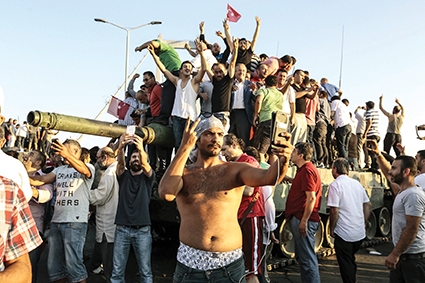Conjecturing Turkey’s Attempted Coup
It’s readily apparent that the July 15th attempted coup in Turkey caught everyone by surprise. The very idea was off the analytical radar screen. Military coups were passe, a relic of the Cold War era. Furthermore, the Pashas (aka Turkey’s military leadership) had been chastened by a series of purges regarding alleged conspiracies against civilian rule, particularly Recep Tayyip Erdogan’s 13 year tenure as Prime Minister now President. The nation’s EU drive was another factor and a putsch would negate any progress Turkey had made to formally become a part of Europe.
Obviously these assumptions need to be re-examined. There’s dissension within Turkish military ranks as to where the nation is heading. The list of grievances – terrorist bombings, the Kurdish conflict, neighboring Syria’s ongoing quagmire, Erdogan’s growing authoritarianism – likely prompted what occurred. Questions linger as to who masterminded this effort, with speculation ranging from a once-close ally of Erdogan’s to theories that the coup might have been deliberately staged by the government itself. What’s implicit with this outlook is the military having been led astray by a manipulative force outside its purview. Are these accurate evaluations?
The government narrative
Turkish officials condemn Fethullah Gulen, a cleric living in the United States for what transpired. Until the recent past, Gulen was closely aligned with the Erdogan administration and an influential factor in the rise of Islamist politics within Turkey. The Gulen network, commonly referred to as the Hizmet (‘movement”), contributed financial and organizational support to solidifying Erdogan’s governmental hold. Several of Turkey’s ministries, noticeably those dealing with security matters, became Hizmet enclaves. A “parallel state,” as the Erdogan administration now derisively calls it, was being formed.
The Erdogan-Gulen alliance began disintegrating when the former began to cull the movement’s influence in 2013. Government audits were launched against Gulen’s commercial and educational enterprises – the core of Hizmet’s financial support – while Gulenist-dominated agencies were investigated. In retaliation, the Hizmet released information reflecting widespread corruption among government ministers and several of Erdogan’s business associates. The Erdogan family was eventually implicated, prompting a massive purging of governmental employees. Bureaucracies affiliated with the Gulenists were especially targeted, the foremost being the police, judicial and intelligence agencies.
Gulen has denied being behind the attempted coup, declaring himself “as someone who suffered under multiple military coups during the past five decades” and therefore insulted “to be accused of having such a link to such an event.” The government and most of Turkey’s media believes otherwise, seeing this as a concerted effort by the Gulenists to regain authority.
The anti-government narrative
Certain media outlets suspect the coup was deliberately created by Erdogan and his colleagues for political purposes. According to this viewpoint, the undertaking was badly coordinated, lacking a coherent command structure; vital matters considering the risk and magnitude involved. An attempted overthrow would also galvanize support for a contentious measure Erdogan wants to achieve, namely his desire to attain greater executive powers. Parliamentary opposition and Turkey’s constitution has made this an elusive goal so far. There is a foreboding sense, especially in secularist circles, that if Erdogan achieves this, the governmental system would resemble Putin’s Russia.
Speculation
Who were the conspirators? Did they act on behalf of the Gulen movement or their own impulse? While the majority of those being detained are privates and NCO’s, the significant number of junior level officers under arrest is leading commentators to deem this a “colonels coup”. Senior command wasn’t supportive of the rebellion, the respective heads of the various branches held by the plotters until the coup fell apart.
Whether the Hizmet was directly involved remains to be seen. Certain officers were likely aligned with the movement, but there are questions about active support, considering the aforementioned purges and logistical challenges for managing such an undertaking from Gulen’s US headquarters. Regarding whether this was a staged incident to enhance Erdogan’s ambitions, the resultant bloodshed – 265 people dead, 1,440 wounded – makes this a cynically bitter assertion.
Instead of viewing the coup as part of the ongoing struggle between Erdogan and Gulen, the officers involved might have participated for a very different reason. What’s missing from many interpretations is the probable concern these participants had about Turkey’s direction. It’s conceivable that this was a last ditch Praetorian effort to salvage the nation from encroaching authoritarianism and Islamist precepts. A core belief still exists in the Turkish military that they are the guarantors of Western secularist values by whatever means necessary. While this was a misguided action with potentially costly consequences for the armed forces and Turkish society, it also conveyed a sense of desperation about the country’s future.
GSR is a policy analyst who has worked with democratic development projects in Turkey and the Caucasus. Copyright GSR 2016
GSR












